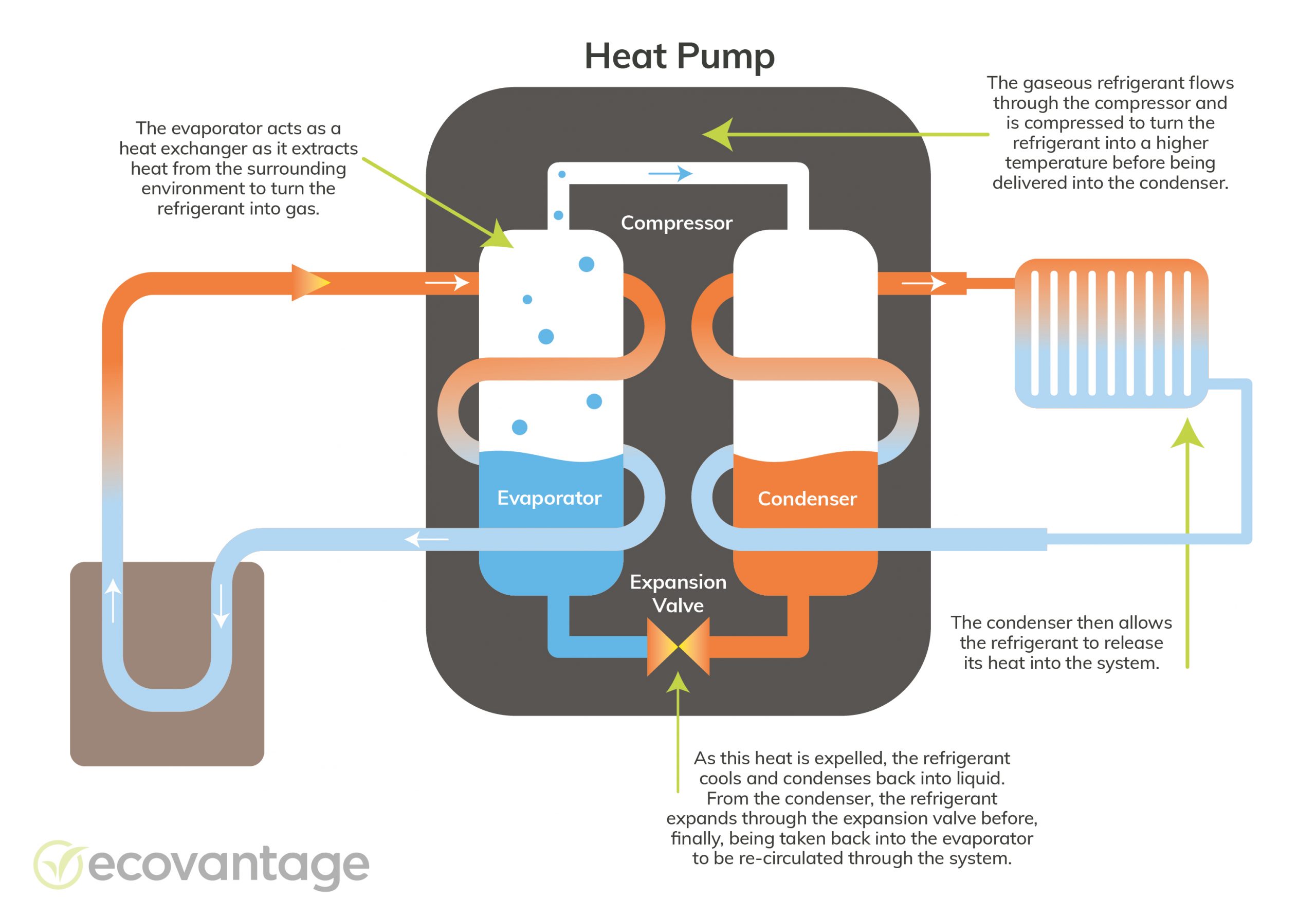What’s a Heat Pump Hot Water System?
A heat pump hot water system uses a small amount of electricity and outside air instead of electricity elements or gas flames to heat your home’s water. Heat pumps are highly efficient and have become increasingly popular and affordable for Australians and can be a great first step away from gas usage at your home. They use approximately half the energy consumed by older hot water systems.
Ecovantage has a range of high-efficiency heat pump hot water systems – whether you have an old electric or gas storage hot water system or need a heat pump for a brand new home, Ecovantage has you covered.
How Do Heat Pumps Work?
Heat pumps are commonly referred to as ‘refrigerators in reverse’ because instead of taking the heat from something we want to cool and pushing that heat back into the environment, we take heat from the surrounding environment to heat water and push the cool back into the environment. Modern split system air conditioners use similar technology both ways.
Our environment is heated by the sun. This heat is in the air around us, in our water and in the ground too. Depending on the energy source, one-part electrical energy can convert up to five parts of environmental energy into heating energy that’s applied to the water as it is pumped around. Heat pumps can still extract enough energy from outdoor temperatures that are as low as -20°C which means Australian winters are no battle for heatpumps.
There are four major components:
-
- The evaporator,
- The compressor,
- The condenser, and
- The expansion valve.
First, the evaporator acts as a heat exchanger as it extracts heat from the surrounding environment to turn the refrigerant into gas. The gaseous refrigerant flows through the compressor and is compressed to turn the refrigerant into a higher temperature before being delivered into the condenser. The condenser then allows the refrigerant to release its heat into the system. As this heat is expelled, the refrigerant cools and condenses back into liquid. From the condenser, the refrigerant expands through the expansion valve before, finally, being taken back into the evaporator to be re-circulated through the system. It’s a continuous cycle.
Let’s look at that in a diagram…

Will I Actually Save Money?
You may be unsure whether a heat pump will actually save you money so, we’ve broken down some of the facts about energy costs.
Sustainability Victoria has provided data that compares the running costs from a variety of Hot Water appliances to help show which option is actually the most cost-effective method of heating your water.
The data compares a 5.5-star gas storage system, a 7-star gas instantaneous system, an electric storage off-peak system, a high-efficiency solar electric boosted system, an instant LPG system, and a high-efficiency hot water heat pump on an off-peak tariff.
For Australian households who use the very common electric storage hot water system, the average annual cost to heat water is $595. Heat pumps, on the other hand, can do the same job for approximately $450 cheaper (75% less).
While some may argue that the initial cost of a heat pump is higher than that of a gas hot water system, the government(s), state and federal, provide a generous incentive that allows Ecovantage to upgrade electric hot water systems for a very small fee in most cases. Heat pumps also have an impressive lifespan which allows you to save more over the 15 year lifetime.
It’s important to remember though that each home’s precise running costs will depend on the electricity tariffs, pump model, and hot water usage.
Heat Pumps with Solar.
If you have installed or are considering installing solar panels, you’ll be able to generate energy from your own roof that would be used to operate your new efficient hot water system. This can further reduce your energy bills dramatically.
How Does This Reduce my Environmental Footprint?
It’s simple, really.
If replacing an electric storage hot water unit, your electricity use will be significantly lower. If the electricity is coming from the grid, it is simply that you will be using a lot less and the emissions associated will therefore be significantly lower. If you have solar, it may be that you now have more solar electricity for other uses?
If replacing gas, it is still a fossil fuel, therefore burning creates emissions and adds to global warming and climate change. While both gas heaters and heat pumps produce about 1.6 tonnes of greenhouse gas per year, heat pumps can pair with solar PV and will dramatically reduce this 1.6 tonnes.
As the world switches to using more renewable energy, the carbon footprint of your electric heat pump will reduce. So, if you want to save money and reduce your carbon footprint an electric heat pump is a great option.
 Victoria
Victoria New South Wales
New South Wales South Australia
South Australia Queensland
Queensland

